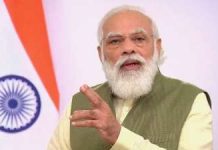Bhubaneswar: Development is the most widely used word in modern times. The economists say there is a difference between economic growth and development. The political leaders are mostly unaware of this difference. In reality when it comes the development they speak economic growth. Some people understand the development in a more narrow way as construction of infrastructure like roads, buildings, ports, electricity, and so on. The definition of development is broader than growth. Similarly, the definition and range of human development are far broader than normal development. Recently the famous economist Prof. Partha Dasgupta has informed about a new measurement. That is called inclusive growth. In today’s time, it has become pertinent to discuss this subject.
Gross Domestic Product( GDP) measure growth. For more than 70 years various countries in the world have been seeing their reflection through the mirror which is growth and its measure GDP. Over the years, GDP has become the most important and easy measure for a country’s overall economic health. GDP was introduced as a remedial measure to the great economic depression that occurred in 1930 across the world. After that GDP was used as a weapon in the preparation of the second world war in America. GDP is a calculation, an account of all the transactions that take place in the economy through money. Something which is not sold for money is not included in GDP as well. There are many such things and services which are needed for human survival that is not bought by money, like mother’s love and care, oxygen from a clear atmosphere etc. If a woman gets a vessel full of water from a well or a river and it does not cost her any money then it is not included in GDP, but the money exchanged for a bottle of drinking water bought from a shop is counted in GDP. In most of the underdeveloped countries, a major portion of the economy that is not converted to money remains out of the GDP. Economic Growth does not speak anything about the growing economic inequality. If the rich are getting richer and the poor is struggling to survive, then such a question will certainly arise who is getting benefitted from such growth.
The novel laureate economist Simon Kuznets is known as the inventor of GDP. While accounting for America’s GDP he was dissatisfied with this economic measure, as it also involved some economic exchanges that did not serve the interest of human society. In 1968 Senator Robert Kennedy of America said sarcastically: GDP can measure everything other than health, education, and child welfare that make life worthwhile.
It is believed that the economic situation in various countries can be fully understood based on GDP figures even though it may not give a completely satisfactory standard. According to some people, rather than GDP, the per capita income is an appropriate indicator of a country’s economic situation. While measuring the per capita income, GDP is divided by population. India ranks 6th in the world in terms of GDP, ranking 145th in the world in terms of per capita income. Recently, in a newspaper column a prominent economist in the world, Ruchira Sharma has argued that to analyse and compare between countries, per capita income should be taken into account. According to him, the country which has more per capita income also has progressed more in the field of education, health care, and child welfare. Let’s pause the argument of whether it is correct or not and move on to the discussion on Human Development Index.
Since 1990, in favour of UNDP, given human development and quality of life, the development of different nations have been evaluated. Initially, Pakistani economist Mahabub All Hak played the main role in this. Gradually many other renowned economists including Amartya Sen had participated in the preparation of the index. In the beginning, other than GDP,v Human Development Index was prepared based on human lifespan, education, easy access to nutritious food, and infant mortality. Later, indicators like women’s empowerment, level of inequality, and human freedom etc. were included. As there is both GDP and quality of life for ordinary people incorporated in this index, it is considered as a more improved index than the GDP. In this measure, the richest nation in the world may not be listed first in terms of human development. Even as oil-rich eastern nations have higher per capita incomes, their place in terms of human development is relatively low. In 2020, India was in 189th position in this index among 132 countries.
We have to look into another aspect while discussing development. That is natural resources are part of the economy. The development helps only to increase the national income but in that process, natural resources and the environment continue to erode. This kind of development can never be sustainable, but rather must be temporary. Mahatma Gandhi was well aware that the way western countries have developed doesn’t apply to the whole world. The process of so-called development after the Industrial Revolution in Europe may have revolutionised the way of life of the larger masses, but because of that, the natural environment declined. The result is a catastrophic climate change that raises questions about the sustainability of the entire planet.
The British government recently commissioned a world-renowned professor Partha Dasgupta to assess how biodiversity has been affected by economic development. The report prepared by him has been published a few months back. It is called Economics of Biodiversity: A review of Dasgupta. His report is worth reading for everyone. He has mentioned in his report how the economy has completely ignored nature. According to the report, the world’s economic output has increased 15 times more since1950s, while the global biosphere has shrunk abnormally. For millions of years, the rate at which biodiversity was declining has now increased by 100 to 1000 times.
According to Dasgupta, the economists and different countries gave excessive importance to economic growth and neglected nature, so such a situation has raised. Most economists stress international trade in the development of the nation, but possibly international trade helps to transfer the goods and properties from poor countries to rich countries. Globalisation has multiplied international trade but no government record mentions about the poor countries bore the damage caused by this revolution. Dasgupta makes it clear in the report that the social damage caused by the natural resources extraction can’t be measured correctly. GDP may be a needful measure for a short term analysis of the overall economy, but it is not a suitable measure for a country’s long term development, stated by Dasgupta. At last, he has recommended the right measure for real development. That is called inclusive wealth. In this standard three types of capital can be included: produced capital, human capital and natural capital. Only after considering these three components can the direction and size of the country’s real sustainable development be determined.
-OdishaAge



















